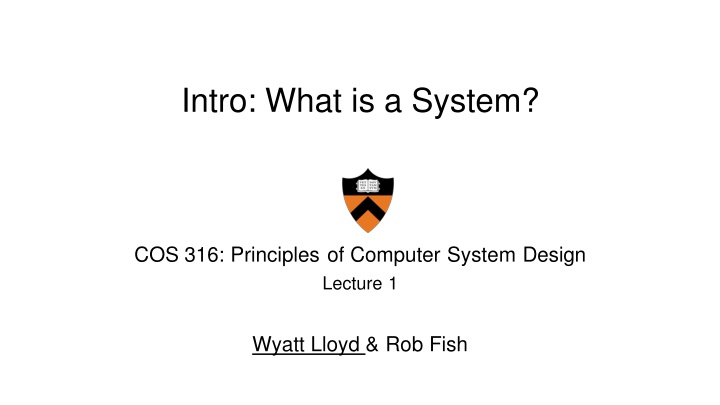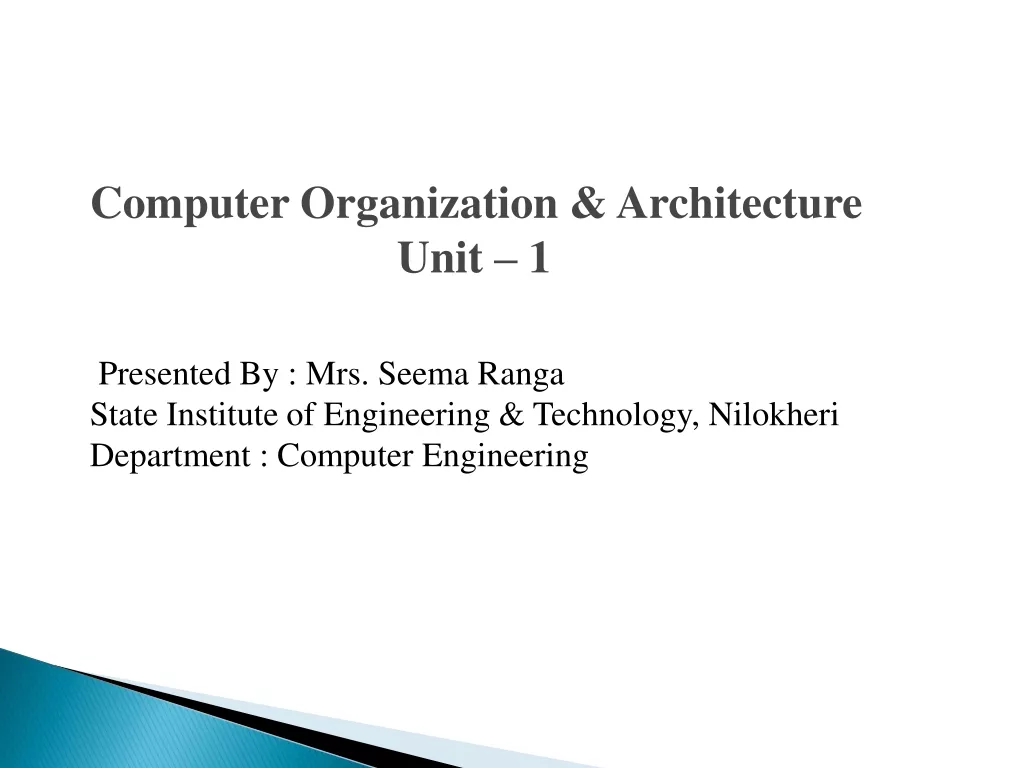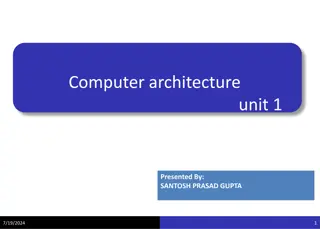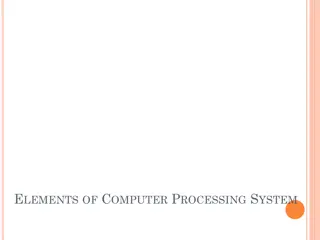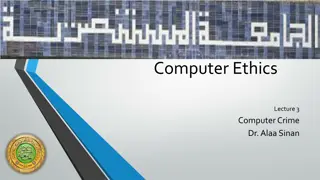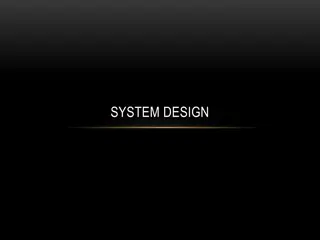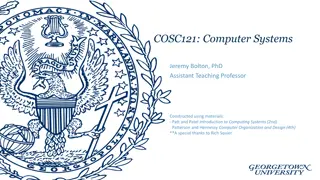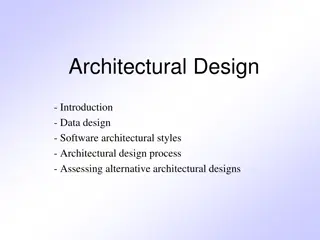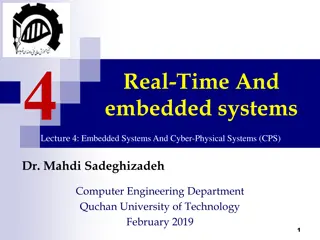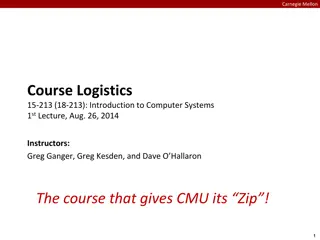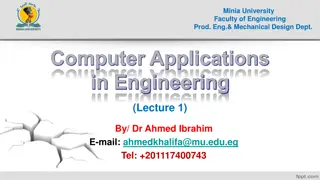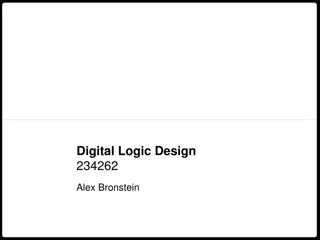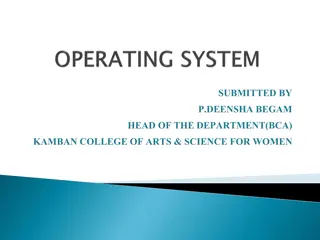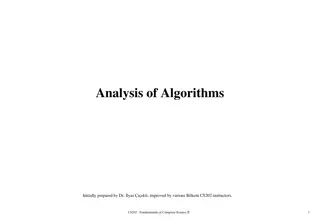Introduction to Computer Systems Design
The fundamental principles of computer system design with a focus on systems, interfaces, resources, and complexities. Discover the role of systems in mediating access to shared resources, isolating applications, and abstracting differences in implementation. Examples and illustrations help elucidate concepts like operating systems, kernels, web frameworks, and more. Learn about system calls, hardware resources, isolation mechanisms, and the layered structures of system stacks. Appreciate the ubiquitous presence of systems in applications, network infrastructures, and hardware configurations.
Download Presentation

Please find below an Image/Link to download the presentation.
The content on the website is provided AS IS for your information and personal use only. It may not be sold, licensed, or shared on other websites without obtaining consent from the author.If you encounter any issues during the download, it is possible that the publisher has removed the file from their server.
You are allowed to download the files provided on this website for personal or commercial use, subject to the condition that they are used lawfully. All files are the property of their respective owners.
The content on the website is provided AS IS for your information and personal use only. It may not be sold, licensed, or shared on other websites without obtaining consent from the author.
E N D
Presentation Transcript
Intro: What is a System? COS 316: Principles of Computer System Design Lecture 1 Wyatt Lloyd & Rob Fish
Today: Systems! Next time: Course Overview, Syllabus,
Example Systems Operating system (OS) kernel The Internet Database Distributed file system Web framework Game engine
What is a System? Provides an interface to underlying resources Mediates access to shared resources Isolates applications Abstracts complexity Abstracts differences in implementation
Example System: OS Kernel Interface: system calls Underlying resources: hardware (CPU, memory, network, disk) Isolation: Firefox, terminal, zoom, don t worry about each other Abstraction: Collection of system calls Instead of specific protocols for using specific devices Don t need to rewrite Firefox to display on new monitors, or save to new disks, or
Systems Stack (terminal) Application Filesystem O S TTY Hardware
Systems Stack (Firefox) Layout engine JS VM Application Database Window manager Network O S Graphics Scheduler Filesystem Hardware
Systems Stack (Firefox to Wikipedia) Application Distributed Systems Application Network FS Network FS Network Internet OS O S OS Hardware Hardware Hardware
So Many Systems [Slide from Kaushik Veeraraghavan Talk s on Kraken at OSDI 16]
Systems Are Everywhere! People use applications Applications are built on systems On systems on systems on systems If you re building applications Useful to understanding underlying systems What could be causing X? Why can t they do Y? What can I trust Z to do or not? Web Server Network OS If you re building systems That s what this is all about! Useful to understanding your underlying systems
Why do we build systems? Sharing: Mediates access to shared resources Portability: Abstract differences in underlying implementations Safety: Isolate resources and other applications from faulty apps Abstraction: Make complex resources easier to use
Why Are Systems Challenging? Part-1a Correctness Incorrect system => incorrect applications Correctly implement interface s guarantees Performance Slow system => slow applications Make system fast enough Security Insecure system => insecure applications Build security into the system
Why Are Systems Challenging? Part-1b Distributed storage system that keeps data forever (e.g., videos) Correctness Accurately retain data forever. Really delete data on deletes. Performance Fast and highly concurrent. Security Only allow authorized users to retrieve data
Why Are Systems Challenging? Part-2a How general should an interface be? More general => supports more application-level functionality Less general => easier to implement, easier correctness, better performance, easier security How portable should an interface be? More portable => supports more underlying resources Less portable => Design tradeoffs!
Why Are Systems Challenging? Part-2b Distributed cache that provides fast access to popular data How general should an interface be? Read(key) Write(key, value) Read_transaction(<keys>) Write_transaction(<keys>,<values>) Read_and_write_transaction(<read_keys>, <write_keys>,<values>) Design tradeoffs!
Why Are Systems Challenging? Part-2c Distributed cache that provides fast access to popular data How portable should an interface be? Cache in DRAM Cache on SSD Cache on NVM Cache on HDD Design tradeoffs!
General vs Portable Interfaces Cache A: Read, Write on DRAM, SSD, NVM, HDD Cache B: Read, Write, Read Transaction, Write Transaction on SSD Which cache is more general? More portable? PL Example: Javascript vs Assembly?
Systems We Will Cover In This Class Distributed Systems Application Distributed Systems Networking Security Network Network Operating Systems Security OS OS Security Hardware Hardware
Lets Build a Netflix Video storage Video encoding Video delivery over network User authentication Stream authorization Metadata indexer Search & recommendations Comments/reviews ...
Lets Build a [mini]-Netflix How many users? ~5 Can everyone access everything? Yes How many movies? ~100 How large are movies? ~20GB/hour x ~2 hours = ~40GB/movie Max simultaneous streams? ~2 Lots of metadata to search? No! Just 100 movies, a tiny list
Lets Build a [mini]-Netflix How much storage? 100 * 40GB = ~4TB How much bandwidth? 20GB / 3600 * 2 = ~91Mbps Less with encoding 5 users 100 movies 40GB per movie <=2 streams How much CPU? May be best to encode each stream on-the-fly Only 2 streams, so a few cores at full capacity should work
Lets Build a [mini]-Netflix ~4TB storage ~91Mbps max bandwidth ~8 cores Database Auth. Application Encoder Video files Network Filesystem O S Scheduler Hardware
Lets Build a [large]-Netflix How many users? millions Can everyone access everything? No How many movies? ~1000s Max simultaneous streams? ~1000s Lots of metadata to search? Yes! Millions of movies
Why Do I Love Systems?! Work on the hard problems, so applications don t have to Correctness as a puzzle: reason through all corner cases Performance is a different type of puzzle: Where are bottlenecks, how to speed them up? Art of reasoning about tradeoffs: e.g., Interface vs. Performance Multiplicative impact: improving systems improves all apps built on them
Summary Application Distributed Systems Security Systems abstract underlying resources Network Network Security OS OS Systems are everywhere Hardware Hardware Systems are challenging and interesting and cool This class is about systems: details next lecture
